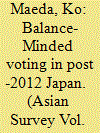| Srl | Item |
| 1 |
ID:
192849


|
|
|
|
|
| Publication |
Japan,
|
| Summary/Abstract |
This study employs survey data to characterize a new kind of strategic voting behavior in post-2012 Japan. Since the Liberal Democratic Party (LDP) returned to power in 2012, it has been winning every national election, while the opposition camp has been fragmented into many parties, none of which has been seen as a viable contender to the LDP. In this situation in which the LDP will certainly win, there are citizens who vote for an opposition party, especially the largest one, though they do not believe it is capable of governing the country. Their concern is the balance of seats among the parties. These strategic voters tend to be older, more educated, richer, and more attentive to political news than those who genuinely support the opposition.
|
|
|
|
|
|
|
|
|
|
|
|
|
|
|
|
| 2 |
ID:
153685


|
|
|
|
|
| Summary/Abstract |
The Japanese Communist Party’s tumultuous electoral performance, especially the sudden surge in the 2014 general election, is an intriguing phenomenon. Analysis of electoral data reveals that a large number of votes shifted back and forth between the Communists and a few new right-wing parties in the last three elections.
|
|
|
|
|
|
|
|
|
|
|
|
|
|
|
|
| 3 |
ID:
100580


|
|
|
|
|
| Publication |
2010.
|
| Summary/Abstract |
This study seeks to identify the factors that caused the historic defeat of Japan's longdominant party in the 2009 election. Employing district-level data, I show that a large national swing occurred that overrode district-specific characteristics, and that the electoral coordination of opposition parties helped bring about victory.
|
|
|
|
|
|
|
|
|
|
|
|
|
|
|
|
| 4 |
ID:
191968


|
|
|
|
|
| Summary/Abstract |
The Liberal Democratic Party maintains a dominant position in Japanese politics while the opposition side is fragmented into many parties. Small opposition parties, namely the Communists, are still surviving even though it has been almost three decades since the 1994 electoral law reform, which made it difficult for such parties to exist. Fragmentation of the opposition is giving an electoral advantage to the ruling party. How can small opposition parties survive? An empirical analysis of voter survey data supports the argument that the controversy over a constitutional revision is playing a role in preventing anti-government voters from unifying under a single party.
|
|
|
|
|
|
|
|
|
|
|
|
|
|
|
|